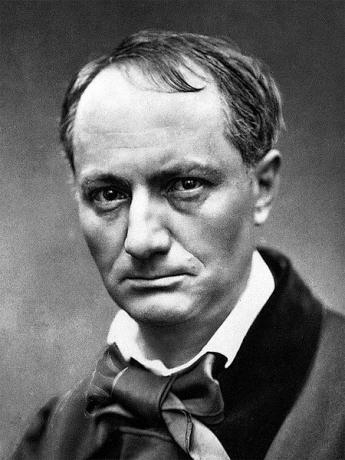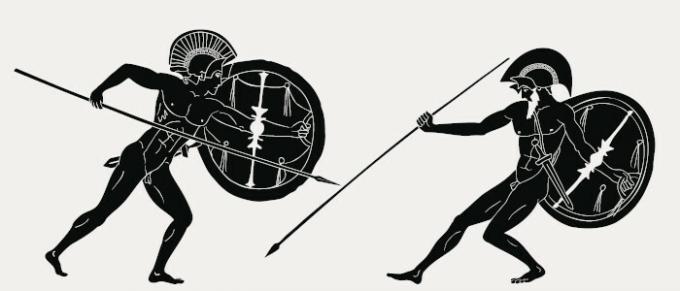Charles Baudelaire, French writer, was born on April 9, 1821, in Paris. At the age of six, he lost his father, and his mother remarried. Very attached to her, the poet later developed a strong revulsion for his stepfather. Throughout his adult life, he lived deep in debt, despite having received a considerable inheritance from his father.
Thus Baudelaire, who died on August 31, 1867, built his reputation as a spendthrift, bohemian, dandy, and revolutionary. He became the forerunner of European symbolism, mainly due to his book, the evil flowers, accused of immorality by the French authorities of the mid-19th century. This work is composed of poems written with Alexandrian verses and octosyllables, whose sound and visual effects are evident.
Read too: Augusto dos Anjos – poet whose work is similar to Baudelaire's
Biography of Charles Baudelaire

Charles Baudelaire was born on April 9, 1821, in Paris, France. The writer's father - François Baudelaire (1759-1827) - was a priest, but he left the cassock and married the painter Rosalie Janin (1775-1814). With her he had a child. After his wife's death, he married Caroline Dufayis (1793-1871), much younger than he.
From this relationship was born the poet Charles Baudelaire, who lost his father when he was six years old. Later, his mother married the military man Jacques Aupick (1779-1857), with whom Baudelaire had a lot of friction after adolescence. This is because the writer, throughout his life, was affectionately very attached to his mother. However, at the beginning of their marriage, he admired his stepfather, whom he called his father.
Due to Aupick's career, they lived in Lyon between 1831 and 1836. Afterwards, Baudelaire went to study in Paris at the Lycée Louis-le-Grand. He was a very dedicated student, but, due to an incident with a colleague, he was expelled from the institution in 1839. That same year, he passed the baccalaureate, a test that allowed him to enter Higher Education, therefore, was equivalent to the completion of High School.
Do not stop now... There's more after the advertising ;)
The writer then lived in the Latin Quarter, in Paris, for two years, and made many debts. However, at the age of 21, he received his father's inheritance, a considerable fortune, half of which he spent in two years. So his mother and stepfather decided to intervene, and Narcisse Désiré Ancelle (1801-888), a lawyer, became legally responsible for managing the remaining money.
The poet he started to receive a fixed amount every month, and obviously he didn't appreciate this situation. Although the monthly amount was enough for his survival, he spent a lot. Thus, her relationship with her mother became conflicted, and her aversion to her stepfather increased. However, in the midst of debt and frustrated attempts to work conventional jobs, there was literature, to which the author tirelessly dedicated himself.
Early in his career as an art critic in the 1840s, the bohemian and dandy Charles Baudelaire still appreciated the romantic aesthetic. In that same decade, he met Jeanne Duval (1820-1862), a Haitian actress, with whom he lived for some time and lived a torrid romance.
In the 1840s, the author developed gonorrhea, acquired syphilis, and tried to kill himself (on June 30, 1845). This contributed to fuel your fame as a damned artist, revolutionary not only in art. He participated in the Revolution of 1848. However, his political fervor ended when Louis Napoleon Bonaparte (1808-1873) became emperor in 1852.
Approximately, in 1854, he began his romance with actress Marie Daubrun. Two years later, his translation of the book extraordinary stories, in Edgar Allan Poe(1809-1849), of whom he was a great admirer, was published. That year, he and Jeanne Duval parted ways. In 1857 Baudelaire published his most famous book, entitled the evil flowers.
The work was censored for immorality, and Baudelaire prosecuted. At the end of the trial, six poems were banned, it's the book was sold again after the censored texts were extracted. However, the process served as propaganda for the work, which, despite negative reviews, received praise from some renowned critics and famous writers, such as Gustave Flaubert (1821-1880) and Victor Hugo (1802-1885).
After the death of his stepfather in 1857, Charles Baudelaire reconciled with his mother. However, the writer's financial life continued in turmoil. So, in 1864, he moved to Brussels, where he lectured and lived miserably until 1866, when he had a stroke, was paralyzed, with speech difficulties, and died on August 31, 1867, in Paris.
See too:Alexandre Dumas – French author linked to romanticism
Characteristics of the work of Charles Baudelaire
Charles Baudelaire is considered the forerunner of symbolism, therefore, his works show traces of this movement, such as:
- Subjectivity
- mystical elements
- Appreciation of the unconscious
- Search for an ideal world
- Insight
- Musicality
- formal rigor
- Pessimism
- Use of ellipsis
- Allegorizing capital letter
- presence of synesthesia
- Preference for the impalpable
Works by Charles Baudelaire
![Cover of the book “As Flores do Mal”, by Charles Baudelaire, published by Companhia das Letras.[1]](/f/f81dfc91cd9c70eebd161863bdf898fa.jpg)
- 1845 Hall (1845)
- 1846 Hall (1846)
- Therefanfarlo (1847)
- the evil flowers (1857)
- Artificial paradises (1860)
- Richard Wagner and Tannhäuser in Paris (1861)
- shipwrecks (1865)
- Aesthetic Curiosities (1868)
- the romantic art (1868)
- short poems in prose (1869)
- intimate diaries (1887)
- Posthumous works and unpublished correspondence (1887)
- my bare heart (1909)
the evil flowers
the evil flowers it is the main work of the poet, as it inaugurates symbolism in Europe. It began to be written when Charles Baudelaire was approximately 20 years old. After publication, it was censored, because, according to the censors, the following poems were against morals and good customs:
- "The Denial of St. Peter."
- "Abel and Cain."
- "Satan's litanies."
- "The killer's wine."
- "The vampire's metamorphoses."
- "The jewels."
- "Damn women."
The book did not please, at first, as French readers and specialized critics were still linked to the romanticism. So, they couldn't appreciate the 166 poems that make up Baudelaire's only book of poetry. In this work, the author's preference for the alexandrinho verse (12 poetic syllables) is evident.
However, some poems are composed with octosyllable verses (eight poetic syllables). Thus, the author works exhaustively on the form of the poems, in addition to producing synesthetic effects, especially sound and visual. Furthermore, the musicality of the verses is evident.
the poems of evil flowers have a succinct language and feature grotesque images. Furthermore, the themes of love, death, boredom, exile are recurrent, in addition to showing a very dark and decadent view of humanity.
Read too: Symbolism in Brazil: how did this aesthetic come about in our country?
Poems by Charles Baudelaire
Next, let's look at two poems from the book the evil flowers|1|. The first is "Damn women", written with alexandrine verses. In it, the women are compared to a herd, which, lying on the sand, looks at its own reflection in the water and feels chills and sorrows. Other women are candidly in love, immersed in illusions or given over to lustful desires. Thus, O me lyricdescribes women as being sacred and, at the same time, profane:
Like a herd absorbed and lying on the sand,
They turn their gaze to the mirror of the waters;
Feet in silent caress and hands clasped together,
They drink the gall of chills and the honey of sorrows.
Some, the heart opening in confidences,
In the woods where a secret stream can be heard,
They spell love in candid cadences
And the pollen scrapes the shoots of the trees;
Others, such as sisters, are slow and shallow
Among the rocks crammed with illusions,
Where he saw Santo Antônio rise like lava
The red bare breasts of her temptations;
There are others that, in the heat of the liquid resin,
In the voiceless hollow of an old pagan den
They ask for you in the midst of the fever that hallucinates,
O Bacchus, at the foot of whom all affliction sleeps!
[...]
Synesthesia is present in: “look”, “chal”, “chill”, “honey”, “hear”, “reds”, “heat”, “fever”. Those sensory stimuli are amplified by musicality obtained from the rhymes and the assonance caused by the repetition of vowels “a”, “e”, “i” and “o”.
already in the poem "A carrion", the lyrical self makes the beloved woman remember the “object” they found in a “beautiful radiant morning”, that is, a “disgusting carrion”. He describes her in gruesome detail, and in the end concludes that his interlocutor will one day be like such carrion:
Remember, my love, the object we found
On a beautiful radiant morning:
In the curve of a shortcut, between pebbles and branches,
A disgusting carrion.
[...]
The sun burned in that putrid turpitude,
How to cook it in red pyre
And for a hundredfold to return to Nature
Everything she had gathered there.
And the sky looked down on the splendid carcass
Like a flower opening itself.
The stench was such that on the sparse grass
You almost succumbed.
Flies buzzed over her belly and, in an uproar,
From there, black gangs came out
From larvae, running like a thick liquid
Among these nefarious rags.
[...]
— Well, you must be like that rotten thing,
This hideous corruption,
Star of my eyes, sun of my life,
You, my angel and my passion!
Yea! such shalt thou be one day, O goddess of beauty,
After the final blessing,
When, under the grass and blooms of nature,
You finally make it to dust.
So, darling, tell the meat to ruin itself,
When the worm kisses your face,
That I preserved the divine form and substance
Of my love already decomposed!
The poem is composed of Alexandrian verses and octosyllables, and presents synesthesia, evident in the words: “radiant”, “Ardia”, “sun”, “red”, “flower”, “stink”, “Zumbiam” and “blacks”. Furthermore, the musicality of the verses is obtained through rhymes and assonance.
See too: Five poems by Alphonsus de Guimaraens
Phrases by Charles Baudelaire
Next, we are going to read some sentences by Charles Baudelaire, taken from his books short poems in prose and intimate diaries:
- "But what does the eternity of damnation matter to someone who has found infinite pleasure in a second!"
- "There is no sweeter pleasure than surprising a man by giving him more than he expects."
- "It's good sometimes to teach the happy people of this world that there is greater happiness than theirs, greater and more refined."
- “Enjoying the crowd is an art.”
- "The poet enjoys this incomparable privilege of being able to be himself and others at will."
- "I passionately love the mystery, because I always hope to unravel it."
- "God is the only being who, in order to reign, does not even need to exist."
Note
|1| Translated by Ivan Junqueira.
Image credit
[1] Company of Letters (reproduction)
by Warley Souza
Literature teacher

